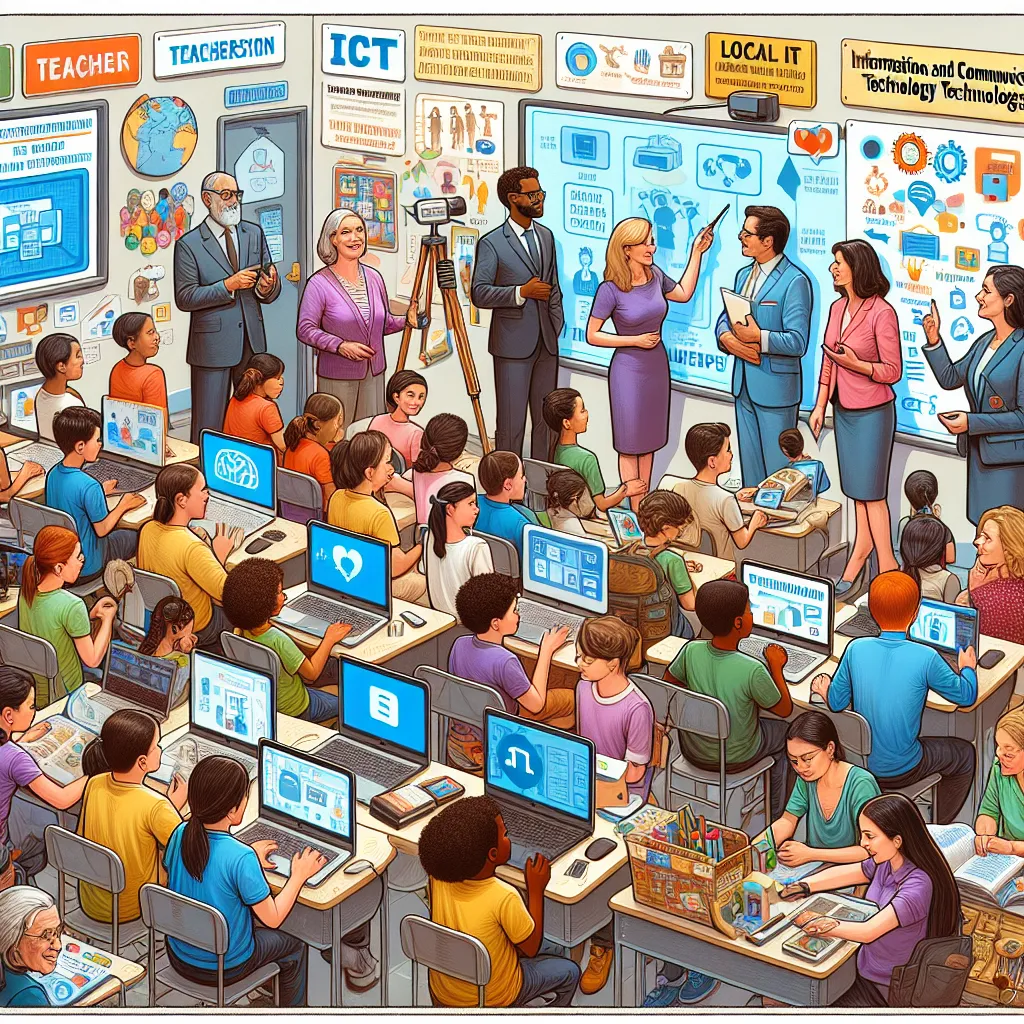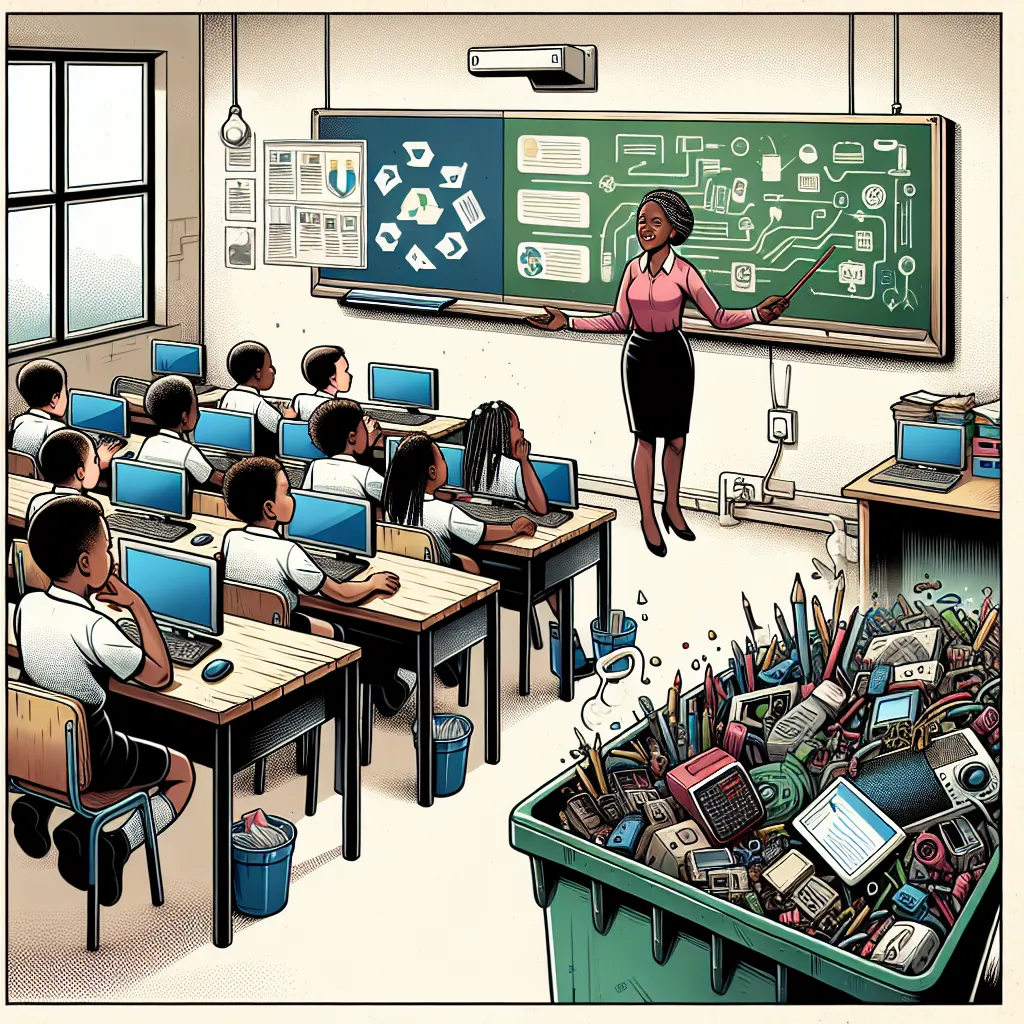Ask AI on The Internet
Question: Discuss the importance of continuous professional development for educators concerning ICT integration. Outline specific training and support mechanisms that can empower teachers to use ICTs effectively. [10] 7. Explore the role of partnerships with local businesses or organizations in aiding South African schools with ICT resources and support. Provide examples of successful collaborations. [10] Part 3: Reflection and Future Action (20 marks) 8. On your personal experiences or observations regarding ICT integration in education. Share one specific example of successful ICT use in a classroom or educational setting and analyse why it was successful. [10] 9. As a prospective educator or concerned individual, propose three actionable steps that you can take to contribute to the integration of ICTs in South African schools. Explain how these actions could positively impact the educational landscape. [10]
**Part 1: The Importance of Continuous Professional Development for Educators Concerning ICT Integration (10 marks)** Continuous professional development (CPD) is crucial for educators, particularly regarding the integration of Information and Communication Technologies (ICT). Here's why: 1. **Adaptation to Technological Advances**: ICT is a rapidly evolving field. Regular CPD ensures educators stay updated with the latest tools, software, and applications, allowing them to implement the most effective and relevant technologies in their teaching. 2. **Improved Student Engagement**: Well-integrated ICT can make lessons more interactive and engaging. CPD helps teachers learn how to use technology to create dynamic content that can captivate and retain students' interest. 3. **Enhanced Teaching Strategies**: Through CPD, educators can learn innovative teaching methods that utilize ICT to foster critical thinking, problem-solving skills, and collaboration among students. 4. **Confidence and Competence**: Regular training boosts teachers' confidence in using new technologies. When teachers are comfortable with ICT, they are more likely to adopt and experiment with different tools in their classrooms. 5. **Addressing Diverse Learning Needs**: ICT can cater to different learning styles and needs. CPD can provide educators with strategies to personalize learning experiences for their students, ensuring that all learners benefit from technology. 6. **Promoting Lifelong Learning**: When educators engage in CPD, they model the importance of lifelong learning for their students. This can instill a culture of continuous improvement and curiosity in the educational community. **Specific Training and Support Mechanisms** 1. **Workshops and Seminars**: Regularly scheduled sessions focusing on new and emerging technologies, and pedagogical strategies for ICT integration. 2. **Online Courses and Webinars**: Flexible and accessible training options that allow teachers to learn at their own pace and convenience. 3. **Mentorship Programs**: Pairing less experienced teachers with ICT-savvy mentors who can provide guidance and support. 4. **In-School ICT Coordinators**: Designating staff members to offer daily support and troubleshoot issues related to ICT use. 5. **Professional Learning Communities**: Establishing groups where teachers can share experiences, challenges, and successes related to ICT integration. 6. **Certification Programs**: Offering certifications for teachers who complete specific training programs, which can also serve as motivation. **Part 2: The Role of Partnerships with Local Businesses or Organizations (10 marks)** Partnerships with local businesses and organizations play a vital role in supporting South African schools in ICT integration. Here's how: 1. **Resource Provision**: Businesses can donate ICT equipment such as computers, tablets, and interactive whiteboards, addressing the resource gap in many schools. 2. **Financial Support**: Sponsorships and grants from businesses can fund ICT initiatives, including infrastructure upgrades and software purchases. 3. **Technical Support and Maintenance**: Local businesses can offer technical expertise and maintenance services, ensuring the sustainability of installed ICT systems. 4. **Professional Development**: Companies can provide specialized training programs for teachers, enhancing their skills in using ICT effectively. **Examples of Successful Collaborations** 1. **Vodacom e-School Initiative**: In partnership with the Department of Basic Education, Vodacom offers an online platform providing free access to a wide range of educational resources aligned with the South African curriculum, helping students and teachers alike. 2. **Telkom Foundation**: The foundation has launched various projects aimed at improving digital literacy and providing ICT resources and training to schools, which has enabled better integration of technology in education. 3. **Huawei South Africa**: Huawei has partnered with various schools to provide ICT infrastructure and training, significantly enhancing the technological capabilities of educational institutions. **Part 3: Reflection and Future Action (20 marks)** **Personal Experience and Example (10 marks)** One notable example of successful ICT integration I observed was a project-based learning activity in a high school science class. Students used tablets and educational software to simulate ecological environments, allowing them to experiment with different variables and see real-time changes in the ecosystem. **Reasons for Success** 1. **Interactive Learning**: The use of interactive simulations made the lesson engaging and provided hands-on learning opportunities. 2. **Immediate Feedback**: Students received instant feedback on their experiments, which helped reinforce learning and correct misconceptions quickly. 3. **Collaboration**: The project encouraged collaboration among students, enhancing communication and teamwork skills. 4. **Real-World Application**: The activity connected theoretical knowledge to practical application, making learning more relevant and meaningful. **Proposed Actionable Steps (10 marks)** 1. **Advocacy for Policy Change**: Working with educational authorities to enhance policies that prioritize ICT integration in schools. This could involve writing proposals, participating in forums, or joining advocacy groups. *Impact*: By influencing policy, there can be systemic changes that ensure all schools receive the necessary ICT resources and support. 2. **Community Engagement Programs**: Organize community-driven initiatives like fundraising events or donation drives to gather ICT resources for local schools. *Impact*: This can bridge the resource gap in underfunded schools, providing them with the means to implement ICT effectively. 3. **Teacher Training Workshops**: As a prospective educator, I can lead or co-facilitate workshops focused on practical ICT skills and innovative teaching strategies. *Impact*: Empowering teachers through training will enhance their confidence and ability to integrate ICT in their teaching, leading to improved educational outcomes for students. By actively participating in these initiatives, I can contribute to a more equitable and technologically advanced educational landscape in South Africa, ensuring that all students have the opportunity to benefit from ICT-enhanced learning.
Think your answer is better than the AI's? Post it below.
Other Most Relevant Posts:
 1. Enhancing Educators Through Continuous ICT Development
2. Partnerships Enhancing ICT Support in South African Schools
3. Successful ICT Implementation in South African Schools
4. Steps to Enha
1. Enhancing Educators Through Continuous ICT Development
2. Partnerships Enhancing ICT Support in South African Schools
3. Successful ICT Implementation in South African Schools
4. Steps to Enha
 1. **ICT in South African Education**
2. **Challenges to ICT Integration**
3. **Digital Divide in Schools**
4. **SAMR Model for Educators**
5. **Innovative ICT in Classrooms**
6. **Professional D
1. **ICT in South African Education**
2. **Challenges to ICT Integration**
3. **Digital Divide in Schools**
4. **SAMR Model for Educators**
5. **Innovative ICT in Classrooms**
6. **Professional D
Question Tags
If you want your question answered by an AI, click here.





Post your own comment: